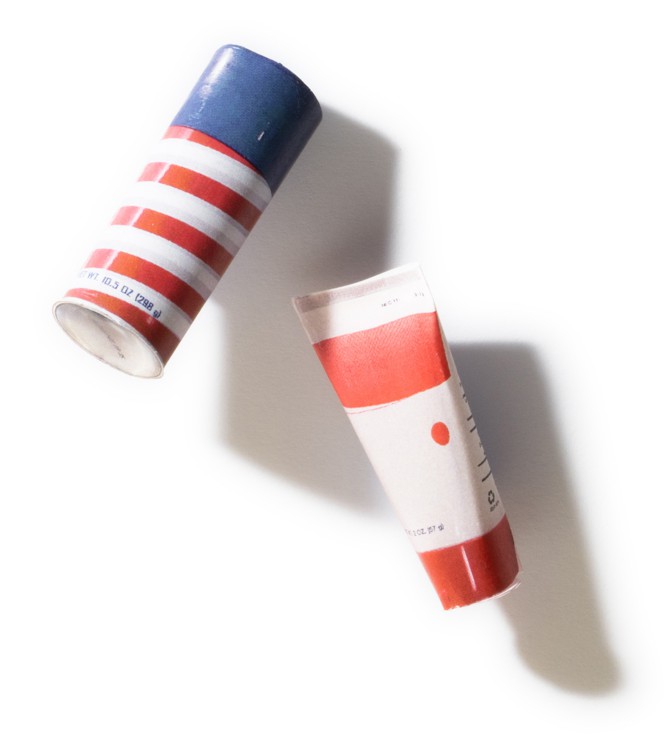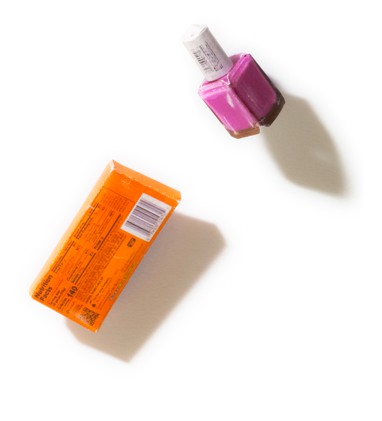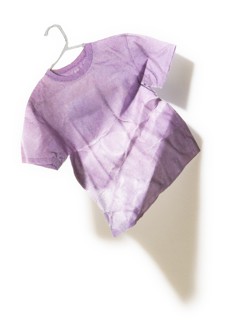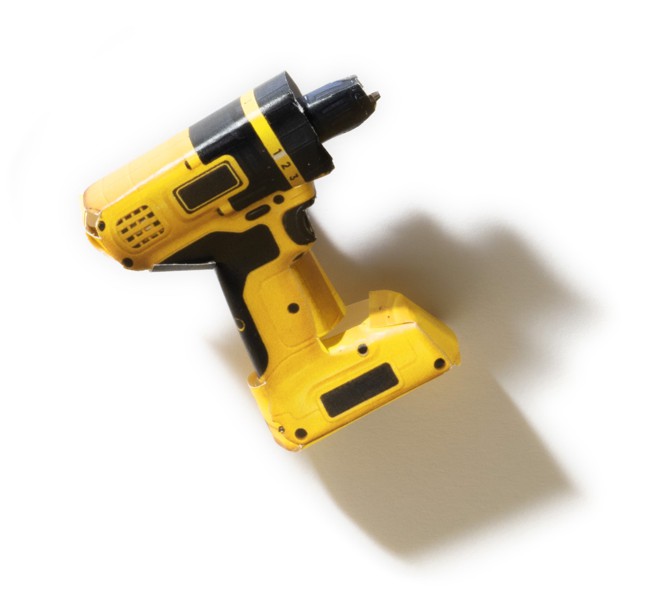No One Knows How to Stop Shoplifters
Illustrations by Ben Denzer
The splendor of the American big-box store lay before me, with its endless variety of shaving products in every imaginable size and color—a retail extravaganza, all of it locked behind Plexiglas. I needed a razor, and in order to obtain one at my neighborhood Target, I had to press a red button to summon a store clerk. Depending on where you live, you may know the drill. I waited in Aisle B45 with two women, one in front of the Dove deodorants, the other in the Old Spice section.
“I keep pushing, but no one comes,” said the Old Spice lady.
Six minutes passed. I pressed my button; my fellow shoppers pressed theirs. The Dove woman let out a dramatic sigh and left. Was a clean shave really worth all this? I looked at Old Spice; we shook our heads and departed. Result: three paying customers sacrificed to the War on Shoplifting.
By definition, most shoplifting is petty plunder—candy bars, baby formula, lipstick. But the small stuff adds up, as demonstrated by viral videos showing shelves of deodorant or cold medicine swiped into Hefty bags by thieves who can’t even be bothered to run away. Some people contend that all of the noise about shoplifting reflects mainly a race-tinged social panic, but the retail industry is not locking up its goods, annoying its customers, and closing stores because of a few viral videos. Companies are doing it because they’re seeing their goods walk out the door, costing them billions.
[From the March 2018 issue: The dark art of stealing from self-checkouts]
Big corporate retailers, mom-and-pop shops, cops, prosecutors, and lawmakers have tried everything to stop the thefts: get tough, be gentle, invest in new surveillance technology, turn pharmacies into fortresses. Nothing seems to work. At my Target in Washington, D.C., I counted 21 aisles of goods locked behind plastic, including toothpaste, body wash, underwear, earbuds, and air fresheners—all items that impulse thieves and organized criminals alike find desirable and easiest to resell, on the street or, more often these days, online.
Who is taking all of this stuff? And why has this age-old nuisance crime become so prevalent?
People steal because it’s easy and—with rare exceptions—free of consequences. David Kimmel, who resides at Northpoint Training Center, a former state mental hospital repurposed as a medium-security prison, in Boyle County, Kentucky, is one of those exceptions.
Kimmel is on his fourth tour in prison for shoplifting, for stealing a $12.88 doll from Walmart and $142.68 worth of ammunition from a Rural King store. This time, Kimmel faced a Kentucky prosecutor and jury who seemed determined to send a message. Each of Kimmel’s two charges was bumped up from a misdemeanor with a 90-day maximum sentence to a felony carrying up to a five-year penalty, mainly because he had already been banned from those stores for shoplifting (several previous instances of stealing from that Walmart, Kimmel told me, and one prior instance—stealing a lawnmower—from the Rural King). The jury didn’t think even that was enough, so they increased each sentence to 10 years. Finally, the jury recommended that Kimmel serve the two sentences not concurrently but consecutively, for a grand total of four decades.

Kimmel steals, he told me, because he’s a drug addict—pain pills, usually, or heroin and fentanyl. He is 39 now and has been shoplifting since he was 15. “I’ve done it hundreds of times,” he said. During all of those years, he was mostly employed—painting houses, doing construction. “I could make a living, pay rent and electric,” he said. “I couldn’t afford drugs.” He sold the stolen items at half their retail price to fences in a nearby parking lot, or on Facebook. He knows it’s not right, but “you ain’t hurtin’ nobody,” he told me. “It’s just from a big company.” If he were back on the street now, as an addict, he figures he’d still be shoplifting.
Kimmel appealed his conviction, and last year, the Supreme Court of Kentucky agreed that he should not have to serve his sentences consecutively. He told me his prison time was eventually cut back to 20 years. But the original sentence reflects how fed up many Americans are with shoplifting. At a rally last fall, Donald Trump announced that if he’s reelected, “we will immediately stop all of the pillaging and theft. Very simply: If you rob a store, you can fully expect to be shot as you are leaving that store. Shot!” At another rally last month, he said he could end shoplifting “immediately” with “one really violent day”— a “real rough, nasty day,” maybe even just “one rough hour”—during which police could take on criminals. Both times, the crowd cheered.
Whereas many on the right see the rise in shoplifting as proof of a nationwide moral collapse, many on the left deny that it’s even happening or that it is a meaningful problem. Shoplifting is one of the hardest crimes to measure, because only a tiny proportion of cases are ever reported to police. Thefts aren’t increasing in every city—in some, reported thefts have gone down—and viral videos of shoplifters-gone-wild don’t necessarily add up to a crime wave. But merchandise is disappearing off shelves at such high rates that stores have resorted to extreme measures to defend themselves—even at the risk of alienating paying customers. The surge, retailers and industry experts say, is real.
[From the November 2024 issue: How carjacking became a teenage pastime]
Shoplifting has soared over the past three years, according to a survey by Jack L. Hayes International, a loss-prevention consulting firm, of 26 big retail companies with, collectively, more than 22,000 stores. The study calculated the total retail losses due to theft to be $7.1 billion in 2022, up from $4.9 billion in 2019. Retailers say stores are closing because they can’t make up their losses, and because some employees are scared and don’t want to work there anymore.
When Mike Mershimer worked as a store detective in the 1980s and ’90s, the primary tools deployed against shoplifters were handcuffs, shame, and mockery. He’d see shoplifters swipe a belt or Air Jordans, and “I’d grab him, throw him on the ground, and cuff him,” he told me. Customers would ridicule the thief as Mershimer marched him out the door. “I never saw those shoplifters again,” he said. Today, Mershimer advises retailers and major brands on store security. Clients are looking for fixes, but though Mershimer can offer constructive advice, he’s well aware that there’s no simple solution. “I get a helpless pit in my stomach,” he told me. “I don’t know what to tell them.”
Guards aren’t the answer, he said. New engagement rules at many retail stores discourage police and security guards from using force to stop offenders—they can no longer grab and cuff shoplifters. Some chains, their lawyers eager to avoid injuries to employees, have made even chasing down shoplifters a fireable offense. In a recent video capturing a shoplifter rolling a cart of stolen items out of a D.C. supermarket, a customer berates the guard for not chasing the thief. The guard replies, “I’m just a visual deterrent,” a phrase now common in the retail-security industry. The criminals, Mershimer told me, “see them for what they are: nothing.”
Some businesses try to look tough by dressing the guards in black tactical gear or equipping them with a German shepherd or a handgun, but “you’re mainly intimidating your customers,” he said. “If I pull up in the parking lot and see that, I’m pulling out.”
Hardening the target—creating what the industry calls the “fortress store”—doesn’t work either. Adding physical barriers and locking away products “not only deters shoplifters; it deters legitimate customers,” Mershimer said. Ditto for limiting the amount of stock placed on display: A mostly empty shelf is more of a turnoff to real customers than to thieves.
Some stores have started locking their front doors, buzzing in only people who look like paying customers. But what does a paying customer look like? Door buzzers are invitations for a discrimination lawsuit.
Yet something has to be done, Mershimer told me. Twenty years ago, if someone swiped a pair of Levi’s, “you could stand the loss. You budgeted 2 percent for shrink. Now you can’t sustain these enormous losses. Now it’s a whole shelf of Levi’s.”

A senior executive at a national chain store was equally frustrated. He spoke with me on the condition of anonymity, because his bosses didn’t want the debate over shoplifting to tarnish the company’s brand. His stores lock up products even though they know it chases away paying customers and is an ineffective barrier against professionals. “They pop the locks; they melt the glass; they take the keys out of employees’ hands,” he said.
In the early 2000s, many cities and states began easing the consequences for shoplifting. Dallas police stopped responding to calls about thefts under $50 in value. In 2014, California voters approved a referendum reclassifying thefts of items worth $950 or less as misdemeanors.
Now the clamor for safer stores is pushing the pendulum back toward enforcement. In the past few years, states such as Florida, North Carolina, and Louisiana have ratcheted up penalties, especially for people caught stealing in a group. Next month, Californians will vote on a referendum that would toughen penalties for shoplifting, essentially undoing the reforms voters approved just a decade ago.
[Read: Why California is swinging right on crime]
Whether this will have an effect on thieves’ behavior is unclear. Shawn Hunter is 29 years old and has racked up more than 40 criminal charges in D.C., plus additional charges in Maryland and Virginia. Earlier this year, in a Target store in a wealthy section of D.C., two cops conducting a retail-theft surveillance operation watched Hunter stuff $54 worth of items into his bag and leave without paying. The officers stopped him just outside the door.
Hunter did not respond to requests for an interview, but I sat behind him in May in D.C. Superior Court as he waited his turn for a hearing. The judge called him to task for having missed a previous court date, but his lawyer explained that he had a good excuse: He’d failed to appear because he was in another courtroom on that same day, answering to yet another theft charge.
Hunter fidgeted throughout the hearing. The second he was dismissed, he jumped up, took the escalator two steps at a time, and burst out of the courthouse with a yelp of regained freedom.
Shoplifting is not a modern development; the term lifting dates back to a 1591 British pamphlet. In the years since, people have come up with plenty of theories about what drives shoplifters to steal. In Victorian Britain, shoplifting was seen predominantly as a female malady. The opening of department stores caused a moral panic—women with money and time to spare, London newspapers warned, were in danger of sullying their virtue and filling their days with petty crime.
When Rachel Shteir set out two decades ago to write a book on shoplifting, her idea was to plumb the roots of the early aughts’ apparent surge in retail thefts. She sold her book, The Steal, to her publisher on the back of a wave of attention devoted to the actor Winona Ryder, who’d been caught taking $5,500 of designer clothes and accessories from a Saks Fifth Avenue in Beverly Hills. According to a witness, Ryder claimed to have been conducting research for a role as a kleptomaniac. Ryder’s attorney denied this and suggested that the actor had assumed that the Saks clerk knew what she had taken and would charge her later for the goods. There was a sense then that women “were stealing not because they needed to eat but because they were shopping addicts,” Shteir, now a professor at DePaul University, told me. Talking about shoplifting in those years often meant discussing mental-health issues such as borderline personality disorder.
Beginning in the late 1960s, and especially after the publication of Abbie Hoffman’s Steal This Book, a different conception of shoplifters emerged, one that continues to dominate on the intellectual and political left. In this view, oppressed people steal to assert their power in the face of a society determined to keep them down. In the 2012 article “Stealing a Bag of Potato Chips and Other Crimes of Resistance,” the sociologist Victor Rios argued that shoplifting was a reasonable act of defiance against a system that preemptively labeled young men of color as criminals. Stealing, he wrote, was a way of “fighting for dignity.”

The idea that theft was both a reflection of social need and a form of political resistance became more entrenched on the left after protests—and, in some places, looting—erupted around the country over the murder of George Floyd, in 2020. Some commentators explicitly lumped shoplifting in with looting as a justified expression of frustration and rage. As Vicky Osterweil, the author of In Defense of Looting, told NPR, looting “freaks people out. But in terms of potential crimes that people can commit against the state, it’s basically nonviolent. You’re mass shoplifting. Most stores are insured; it’s just hurting insurance companies on some level. It’s just money. It’s just property. It’s not actually hurting any people.”
This is not a popular perspective in the retail industry. Those who have studied shoplifting point out that retail theft has always been more common than people think, and not primarily among the poor or those who view themselves as politically oppressed.
An estimated one in 11 Americans have shoplifted at least once. In one study, criminologists spent the spring of 2000 to the spring of 2001 monitoring surveillance video in a major national chain drugstore in Atlanta. They determined that about 20,000 incidents of shoplifting took place in that one store, compared with only about 25,000 larceny-theft cases reported to police in the entire city in 2001. The study used shoppers’ clothing, jewelry, and other markers to draw conclusions about their economic class, providing a rough profile of who steals. The result: The shoplifters were not disproportionately minority, male, and lower-class, as many experts had assumed. In fact, about a third were middle-class and nearly 40 percent were women, and white people were just as likely to steal as were Black or Hispanic people.
These days, industry analysts say they are seeing more middle-class shoplifters than they did pre-COVID, mainly because shoplifters think they won’t face significant consequences (which is likely correct). Men might treat themselves to home-improvement tools and video-game accessories. Women, many of whom are the primary shopper for their family, will pay for milk and eggs but then swipe luxury items that a tight budget can’t accommodate: high-end cosmetics, skin-care products, jewelry.
Retailers are also becoming more concerned about what is known as organized retail crime, which often involves ringleaders ordering up shopping lists of goods they’ve often already sold to customers online. The thefts are contracted out to professional boosters, who rip off home goods, hardware, clothing, and drugstore items from any point along the supply chain, including freight trains, delivery trucks, warehouses, and stores. No reliable statistics show what portion of overall thefts are initiated by organized rings, but estimates range from as little as 5 percent to half of all theft. Coordination online has made organized theft more efficient, but it’s a different kind of puzzle for law enforcement than the far more common, and more psychologically complicated, individual shoplifting.
Why is shoplifting surging now? The coronavirus pandemic and social media are the two factors most often cited by researchers and industry executives.
At the very beginning of COVID’s spread, many categories of crime decreased, because people mostly stayed home and access to stores was limited. Shoplifting apprehensions reported by 22 major retail chains declined by 44 percent from 2019 to 2020, according to the Jack L. Hayes consultants. But since then, the numbers have soared far beyond their pre-COVID levels, reflecting persistent inflation, “less staff on sales floors,” and “thieves viewing shoplifting as a high-reward, low-risk endeavor,” their survey concluded.
Read Hayes is a former store detective with the scars to prove it. Back in the ’90s, his hands were repeatedly cut by shoplifters’ fingernails and pocketknives. These days, he runs the University of Florida’s SaferPlaces Lab, which develops and tests innovations in shoplifting prevention. He’s busier than ever. He told me he’d “seen surges before, but this is different—more significant, more widespread.”
He said that “everything changed” with COVID, “including how you think about other people. Everybody around you is a threat to your health and safety.” Store employees grew less willing to confront thieves, and lifters felt free to ignore shopkeepers’ efforts to halt them. People seemed “quicker to go violent” against clerks who did intervene.
“People just seem bolder,” Hayes told me. “We used to use shame as a deterrent, an informal sanction.” At some point, it stopped working.
Hayes told me that shoplifting has become more common among both casual thieves and hardened professionals. On one end of the spectrum, videos on social media showing young people how easy it is to steal items they’re not allowed to buy—cigarettes, beer—have gone viral, encouraging the curious to try their hand at it. On the other end, some people who formerly sold drugs are now drawn to big-ticket theft—power tools, TVs, laptops—because of the lower risk of punishment.
Thieves advertise their loot on Facebook and eBay, and trade tactical tips on Reddit as well as on more obscure sites. Online communities of pros and amateurs are occasionally shut down, but new ones pop up all the time. Many shoplifters are now trained by helpful online advisers to know precisely what to target. “They come into the store with a list,” the senior retail executive told me. “They want Prevagen or Maybelline. They know when our delivery trucks arrive; they know when we stock the shelves. They know when we’re lightly staffed.”
The internet isn’t just a place to garner tips. It has also, Hayes said, become a place “to showcase what you’ve stolen.” Videos of shoplifters committing their crimes and showing off their loot have become internet mainstays, both a reflection of evolving attitudes toward retail theft and an encouragement for new practitioners. Videos tagged #haul—some set to the tune of Ayesha Erotica’s “Real Messy Bitch” (“Yeah, I sca-a-am and I ro-o-ob, I’mma take everything that you go-o-ot … I love robbery and fraud, I’m a shoplifting god”)—feature slo-mo pans: energy drinks, candies, cleaning products.
The subreddit r/ShopliftersGoneWild, which has been around for two years and has 5,200 members, is run by a 53-year-old man in Florida who works from home for a medical company. He asked not to be named, “because the internet is a crazy place.” He’s not a shoplifter himself; in fact, he’s quite derisive of lifters. His wife works in retail and has long provided him with a steady supply of shoplifting stories at the dinner table. He told me that he launched the forum “to be funny”; he enjoys watching thieves and their critics go at each other in the comments.
GoneWild Man, as I’ll call him, started off posting videos of encounters between clerks and thieves. But the subreddit morphed into a place where compulsive lifters talk about why they do it, and right-thinking Americans confront them with the damage they’re doing to their own community.
“Some people love the risk,” GoneWild Man told me. “It’s the same adrenaline rush as skydiving, but a lot cheaper and safer.” The lifters “try to claim ‘we only do it from the big boxes, not the mom-and-pops,’” he said. “They make themselves out to be the good person.” Or not: Some advise newbies to avoid problems by threatening store security guards that if they “touch me, I’ll sue” or—an enduring legacy of COVID—“I’ll cough on you.”
GoneWild Man often struggles with a “moral dilemma”: Should he shut down the subreddit, especially when he sees people encouraging crime by, say, offering instructions on how to remove security tags from expensive garments?

He says he likes that law-abiding people jump in, trying to talk lifters out of stealing more stuff. But he’s under no illusions that his subreddit is converting thieves into upstanding citizens. It’s hard to detect much shame among brazen lifters. He does, however, see some fear. Perhaps the most frequently asked question on the forum is: “Am I going to get busted?”
If there’s one thing retailers agree on, it’s that the courts will never make shoplifting a high-enough priority. The industry, therefore, devotes enormous energy to figuring out its own defense.
Kay Patel, an engineer for a tech company in Philadelphia, thought that owning a convenience store would be a rewarding side gig. What he didn’t count on when he bought the store last October was about $200 to $300 in goods walking out the door every day. “This place is definitely harder than I thought it would be,” he told me. “People came in and took whatever they wanted.”
Temple University’s campus police have a station down the block, and officers are in and out of Patel’s shop all day. (Patel draws them in with free coffee.) Shoplifters paid the officers no mind. Kids would run in, grab snacks, and bolt. “You can’t do anything,” one of them taunted Patel. He had a point. Patel can’t file an insurance claim without his rates shooting up. He doesn’t want his seven employees chasing or grabbing lifters, because it’s not worth the risk of violence. Patel had 16 cameras inside and outside the store, but his cashiers couldn’t monitor the screens while they rang up purchases.
On a drizzly, gloomy day in May, I watched as a 15-year-old boy strolled toward the exit of Patel’s store, sipping from a Big Gulp cup. From behind the counter, the cashier called to him: “Hey, kid!”
The kid wheeled around and held out his cup: “It’s just water.”
The cashier waved him on. Confrontation diffused. False alarm. What the kid didn’t know was that seconds before the cashier had called out to him, the cashier’s phone had buzzed with an alert. A few months earlier, Patel had installed a security-software product called Veesion—one of a slew of new programs that promise to catch thieves before they steal anything. The software, constantly scanning every aisle of the store, had captured the boy’s image and used AI to analyze his movements. “Gesture close to body,” said the alert, displaying an image of the boy holding his cup up against his chest.
Minutes later, another alert flashed on the cashier’s phone: “Very suspicious,” it said, showing a woman in the back of the store rummaging through her purse. The cashier looked up and saw the woman at the ATM machine. She’d been digging out her bank card.

The software picks up on the kinds of “suspicious cues” that the Atlanta-drugstore study found were the most accurate predictors of shoplifting behavior: people turning their head as they scan the aisles, nervously playing with products, looking for cameras or security tags. Alerts fly when people reach into their pockets, open their handbag, stick a hand inside their jacket. Patel says that Veesion alerts him and his employees 50 to 60 times a day, and about half are false alarms. In the week before my visit to the store, one alert was triggered by a man nonchalantly loading some 30 cans of Red Bull into his backpack. When the cashier confronted the man, he dropped the bag and left, Patel told me. This, he added, happens in many cases when a shoplifter is called out. He told me that his losses have fallen to maybe $75 a day.
Video and AI solutions are all the rage at loss-prevention trade shows. FaceFirst, for example, promises to “instantly detect habitual shoplifters” by running customers’ faces through a database of proven thieves. There’s talk of creating a surveillance network across the retail industry that would allow stores to share images of alleged or convicted shoplifters.
AI doesn’t get bored monitoring video, so it can watch the parking lot and alert store clerks if someone walks toward the shop carrying a crowbar. “Hey, manager, do you want to lock the front door?” the bot might ask. But such technologies also raise the creepiness factor and its more serious corollary: the potential that someone will perceive racial discrimination and take action against your business.
[Read: Defund facial recognition before it’s too late]
Still, the products keep coming. An Irish program, Everseen, recognizes when customers at self-checkout stations mis-scan products (for example, waving a barcode filched from some cheap product over the scanner instead of the one on the steak they’re putting in their bag).
Big home-improvement chains have developed power tools that remain deactivated until they’re purchased. Grocery chains in the U.K. are storing expensive meats in a case that opens only after checkout. Some supermarkets have shopping carts that jam if they approach the store exit without clearing the checkout lane—an extra security layer that may slow down shoplifters but can also make consumers “feel corralled,” says Emmeline Taylor, a criminologist at City, University of London who studies retail theft. Last year, Walgreens opened a store in Chicago in which most products have been removed from the open shelves and customers must order at a kiosk up front, whereupon a clerk retrieves their items from storage.
Barbara Staib, an executive at the National Association for Shoplifting Prevention, has been at this for a quarter of a century. She’s seen fancy fixes come and go. “You can keep going with your technology and your solutions and all the innovation in the world, but if you don’t address motivations, you’re not going to get anywhere,” she told me. That could mean getting shoplifters into counseling, rehab programs, food-assistance services, and job-training classes. Sometimes, especially with casual thieves, a few hours of education about the impact that shoplifting can have on their own friends and family—raising prices, closing stores—can make a difference. Staib’s organization offers a four-hour course focused on sending shoplifters the message that their behavior isn’t harmless. It seems to help: A four-year study in King County, Washington, found that fewer than 6 percent of young people who finished the course were nabbed again for shoplifting.
Such efforts won’t stop organized retail crime, Staib conceded, but they might help the many occasional shoplifters who think thievery is no big deal. “These people you can educate,” she told me. “We can’t stop them; we have to get them to stop themselves.”
But the surge in shoplifting is one piece of a larger collapse of the social forces that once restrained wayward behavior at least as much as the law did: trust, guilt, and shame. It took a lot to get us to this point—huge technological and psychological disruption; the atomization of American life by the anonymity of the internet; the isolation imposed by COVID lockdowns, which eroded many people’s sense of empathy; a lack of consequences for stealing, attributable to reductions in policing and store staffing. It’s hard to see how better surveillance cameras and longer prison terms, let alone programs like Staib’s, could roll back such powerful changes in how we live.
Maybe GoneWild Man was right when he said, “It’s just okay to be a bad person now.”
When you buy a book using a link on this page, we receive a commission. Thank you for supporting The Atlantic.


